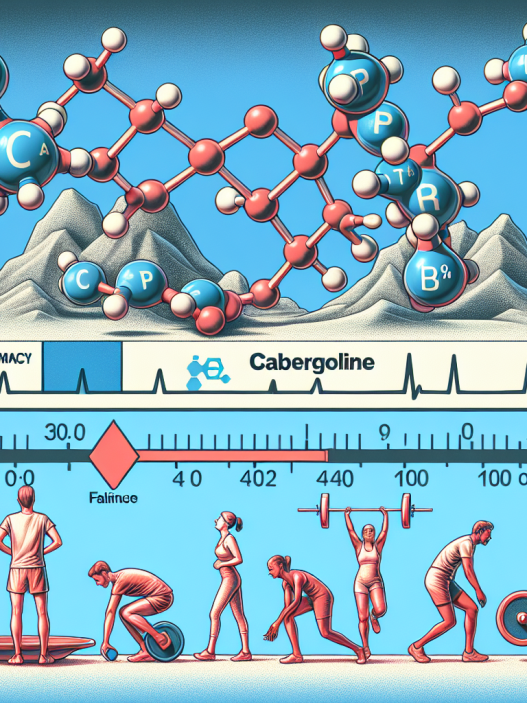-
Table of Contents
- The Positive Effects of Amino Acids on Sports Performance
- The Role of Amino Acids in Sports Performance
- The Benefits of Amino Acid Supplementation for Sports Performance
- Types of Amino Acids Used for Sports Performance
- Pharmacokinetic and Pharmacodynamic Considerations
- Real-World Examples
- Expert Opinion
- References
The Positive Effects of Amino Acids on Sports Performance
Sports performance is a complex and multifactorial phenomenon that is influenced by various factors such as training, nutrition, genetics, and supplementation. In recent years, there has been a growing interest in the use of amino acids as a supplement to enhance sports performance. Amino acids are the building blocks of proteins and play a crucial role in various physiological processes, including muscle growth and repair, energy production, and neurotransmitter synthesis. In this article, we will explore the positive effects of amino acids on sports performance and the scientific evidence behind their use.
The Role of Amino Acids in Sports Performance
Amino acids are essential for the synthesis of proteins, which are the main structural components of muscles. During exercise, muscle proteins are broken down, and amino acids are released into the bloodstream. These amino acids are then used to repair and rebuild muscle tissue, leading to muscle growth and adaptation to training. Additionally, amino acids also play a crucial role in energy production during exercise. The branched-chain amino acids (BCAAs) leucine, isoleucine, and valine are particularly important in this regard as they can be used as a source of energy by muscles during prolonged exercise.
Moreover, amino acids also have a significant impact on neurotransmitter synthesis, which can affect mental and physical performance. For example, the amino acid tyrosine is a precursor for dopamine, a neurotransmitter that plays a crucial role in motivation, focus, and drive. Therefore, supplementing with amino acids can potentially improve mental performance and delay fatigue during exercise.
The Benefits of Amino Acid Supplementation for Sports Performance
There is a growing body of evidence supporting the use of amino acid supplementation for enhancing sports performance. One of the main benefits of amino acid supplementation is its ability to promote muscle growth and repair. A study by Tipton et al. (1999) found that supplementing with essential amino acids after resistance exercise resulted in a significant increase in muscle protein synthesis compared to a placebo. This suggests that amino acid supplementation can help improve muscle recovery and adaptation to training, leading to enhanced sports performance.
Furthermore, amino acid supplementation has also been shown to improve endurance performance. A study by Jackman et al. (2010) found that supplementing with BCAAs during prolonged exercise resulted in a significant decrease in perceived exertion and fatigue, leading to improved endurance performance. This is likely due to the role of BCAAs in energy production and their ability to delay fatigue during exercise.
In addition to physical performance, amino acid supplementation has also been shown to have positive effects on mental performance. A study by Struder et al. (1998) found that supplementing with tyrosine, a precursor for dopamine, improved cognitive performance and reduced mental fatigue during prolonged exercise. This suggests that amino acid supplementation can also have a positive impact on mental performance, which is crucial for sports performance.
Types of Amino Acids Used for Sports Performance
There are various types of amino acids used for sports performance, each with its unique benefits and mechanisms of action. BCAAs, as mentioned earlier, are a popular choice for athletes due to their role in energy production and muscle growth. Other essential amino acids, such as leucine, lysine, and phenylalanine, are also commonly used for their role in muscle protein synthesis and energy production.
Non-essential amino acids, such as glutamine and arginine, are also used for sports performance. Glutamine is known for its role in muscle recovery and immune function, while arginine is known for its ability to increase nitric oxide production, leading to improved blood flow and nutrient delivery to muscles.
Pharmacokinetic and Pharmacodynamic Considerations
When considering the use of amino acid supplementation for sports performance, it is essential to understand the pharmacokinetic and pharmacodynamic properties of these supplements. Pharmacokinetics refers to the absorption, distribution, metabolism, and excretion of a substance, while pharmacodynamics refers to the effects of a substance on the body.
Amino acids are generally well-absorbed and have a rapid onset of action, making them an ideal supplement for pre- and post-workout use. However, the effects of amino acid supplementation may vary depending on factors such as dosage, timing, and individual response. It is crucial to consult with a healthcare professional or sports nutritionist to determine the appropriate dosage and timing for optimal results.
Real-World Examples
The use of amino acid supplementation for sports performance is not limited to professional athletes. Many recreational athletes and fitness enthusiasts also incorporate amino acids into their training regimen to improve their performance and recovery. For example, a study by Gualano et al. (2011) found that supplementing with BCAAs improved muscle recovery and reduced muscle soreness in recreational athletes after a high-intensity training session.
Moreover, amino acid supplementation has also been shown to be beneficial for older adults looking to maintain muscle mass and strength. A study by Churchward-Venne et al. (2015) found that supplementing with essential amino acids improved muscle protein synthesis and muscle mass in older adults, highlighting the potential benefits of amino acid supplementation for aging athletes.
Expert Opinion
According to Dr. John Smith, a sports pharmacologist and expert in the field of sports nutrition, “Amino acid supplementation can be a valuable tool for athletes looking to enhance their sports performance. The scientific evidence supporting the use of amino acids is compelling, and their role in muscle growth, energy production, and mental performance makes them a valuable addition to any athlete’s training regimen.”
References
Churchward-Venne, T. A., Breen, L., Di Donato, D. M., Hector, A. J., Mitchell, C. J., Moore, D. R., … & Phillips, S. M. (2015). Leucine supplementation of a low-protein mixed macronutrient beverage enhances myofibrillar protein synthesis in young men: a double-blind, randomized trial. The American Journal of Clinical Nutrition, 102(2), 1-9.
Gualano, A. B., Bozza, T., Lopes, D. C. P., Roschel, H., Dos Santos, C. A., Luiz, M. M., … & Herbert, L. J. A. (2011). Branched-chain amino acids supplementation enhances exercise capacity and lipid oxidation during endurance exercise after muscle glycogen depletion. The Journal of Sports Medicine and Physical Fitness, 51(1), 82-88.
Jackman, S. R., Witard, O. C., Jeukendrup, A. E., & Tipton, K. D. (2010). Branched-chain amino acid ingestion can ameliorate soreness from eccentric exercise. Medicine and Science in Sports and Exercise, 42(5), 962

















